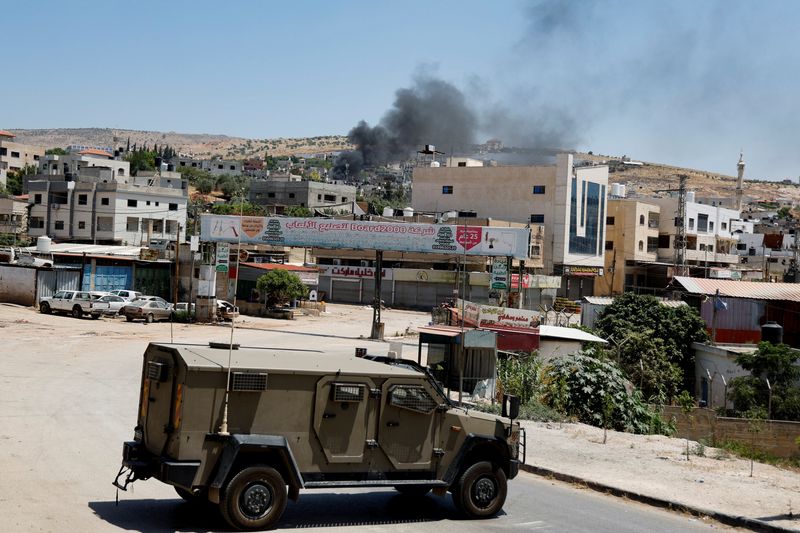By Nidal al-Mughrabi and Daphne Psaledakis
CAIRO (Reuters) -U.S. Secretary of State Antony Blinken on Monday urged Hamas to accept a ceasefire proposal outlined by Washington to end the Gaza war, a plan that the United Nations Security Council voted to support.
On his eighth trip to the Middle East since the war started, the top U.S. diplomat called on countries in the region to pressure the Palestinian militant group to approve the draft. The U.S. has said Israel has accepted it although Israeli officials have not formally announced this.
"My message to governments throughout the region, to people throughout the region, is - if you want a ceasefire, press Hamas to say 'yes'," Blinken told reporters in Cairo.
U.S. President Joe Biden outlined the truce accord last month and it envisions a ceasefire in stages, ultimately leading to a permanent end to the war. But Israel has said it will agree only to temporary pauses until Hamas is defeated, while Hamas has countered it will not accept a deal that does not guarantee the war will end.
With the conflict in its ninth month, the plan got further backing on Monday from the United Nations where 14 members of the Security Council adopted a U.S.-drafted resolution in favour of the proposal while Russia abstained.
Hamas welcomed the U.N. Security Council resolution and said it was ready to cooperate with mediators on implementing the plan. Earlier, senior Hamas official Sami Abu Zuhri told Reuters Blinken's comments were "an example of bias toward Israel".
Blinken left Cairo for Israel where he met Prime Minister Benjamin Netanyahu and Defence Minister Yoav Gallant separately. Blinken emphasised to Netanyahu the importance of a post-war plan for Gaza as well as the need to prevent the conflict from spreading, U.S. State Department spokesperson Matthew Miller said.
The war erupted in October when Hamas-led fighters killed 1,200 people and took some 250 others hostage in a rampage through southern Israel, according to Israeli tallies.
Israel's retaliatory assault on the Gaza Strip has killed more than 37,000 Palestinians and reduced most of the enclave to wasteland, the Gaza health ministry has said.
Ahead of Blinken's trip, Israel and Hamas both reiterated hardline positions that have scuppered previous attempts to end the fighting, while Israel has pressed on with assaults in central and southern Gaza, among the bloodiest of the war.
"We are committed to total victory," Netanyahu said in a statement released by his office, quoting remarks he made on Sunday to relatives of Israelis killed in Gaza. He said he would reject a Hamas demand to "commit to stopping the war without achieving our goals of eliminating Hamas".
Hamas and its allies Islamic Jihad said in a joint statement: "Any agreement must ensure a permanent end to the aggression and a complete withdrawal from the Gaza Strip, reconstruction, lifting the blockade and a serious swap deal."
ASSAULTS IN RAFAH, NUSEIRAT
In Rafah, the city on the southern edge of Gaza where Israel launched an offensive last month, residents said on Monday tanks pressed north in the early hours of the morning. They were on the edge of Shaboura, a densely populated neighbourhood at the heart of the city.
Around half of the Gaza Strip's 2.3 million people had been sheltering in Rafah before last month's assault, and a million have since fled again.
Since last week, Israel has also launched a large assault in the central Gaza Strip, around the small city of Deir al-Balah, the last population centre yet to be stormed. On Monday, residents said the Israelis had pulled back from some areas there but were keeping up air strikes and shelling.
Residents in Nuseirat, north of Deir al-Balah, were still clearing debris after Israel freed four hostages in a massive raid there on Saturday.
Palestinian officials say 274 people were killed, making it one of the deadliest assaults of the war. Israeli forces said they were aware of fewer than 100 Palestinians killed there and did not know how many were combatants.
"We are exhausted and helpless. Enough is enough," said Jehad by text. He and his family fled under fire on Saturday from Nuseirat to Deir al-Balah, their fifth move of the war.
After months of failed peace efforts, Biden chose a new tack with his public announcement on May 31 of a ceasefire proposal. U.S. officials say Biden unveiled it without asking the Israelis first, to increase pressure for a deal.
Full details of the proposal have not been publicly disclosed but, as described by U.S. officials, it is similar to texts floated in previous failed peace efforts: a long truce over several stages, with gradual release of Israeli hostages and Palestinian prisoners ultimately leading to an end to the war.

What is different this time is that Israeli forces have now stormed most territory inside Gaza at least once, and Netanyahu is under greater domestic political pressure to reach a deal.
Benny Gantz, a popular centrist former military chief, quit Israel's war cabinet on Sunday over what he described as the failure to outline a plan for the war's end. That leaves Netanyahu more reliant on far-right allies who threaten to bring down his government if he agrees a deal leaving Hamas unvanquished.
